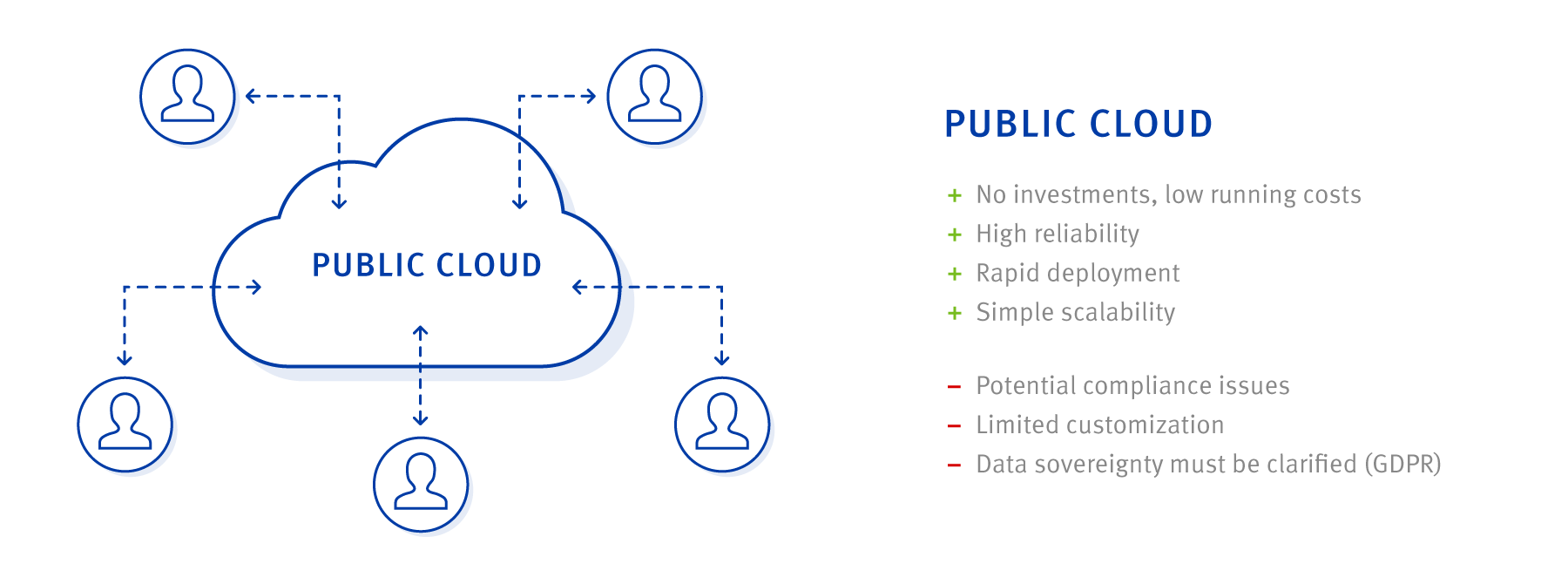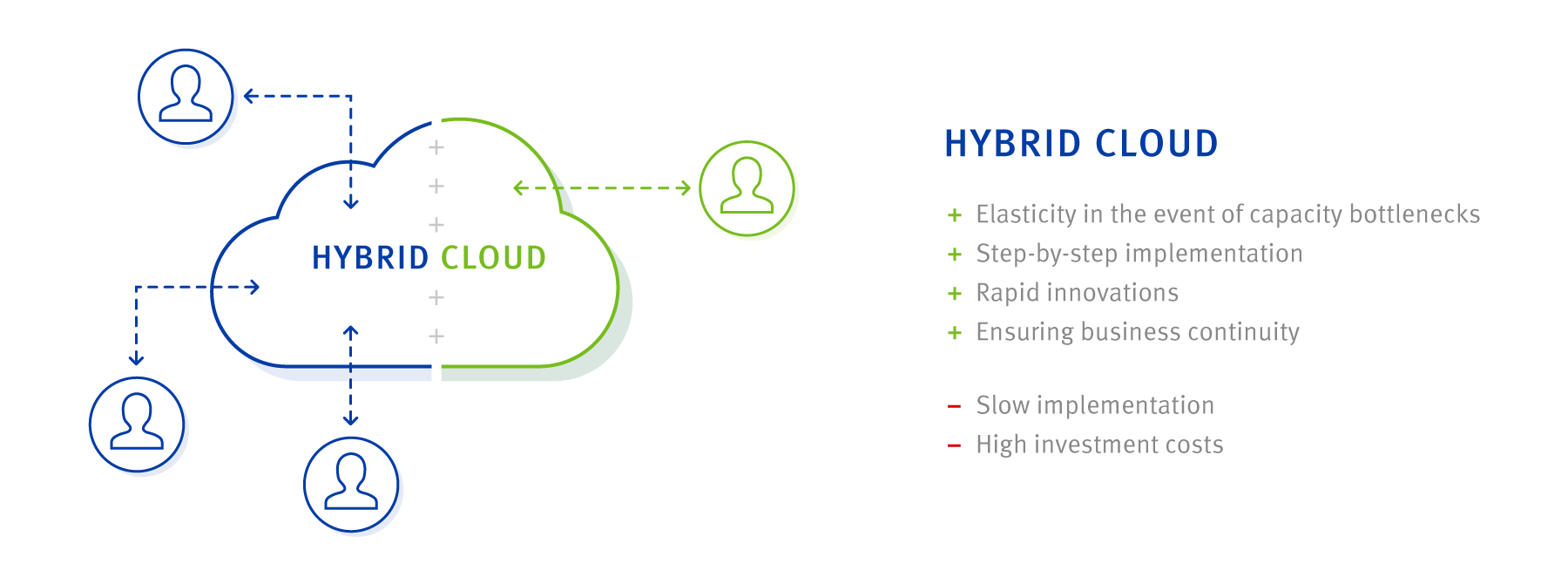Why the hybrid cloud is the best choice of all cloud variants
Cloud computing has become one of the most important IT trends in recent years. Nevertheless, many companies are not sure which cloud variant is best suited to their requirements. There is no solution that fits all requirements. However, the hybrid cloud combines the advantages of private and public cloud environments and therefore represents the best solution for many tasks.
In this article we show you how the public cloud, private cloud and hybrid cloud differ from each other and what advantages and disadvantages the different variants have.
What is a public cloud?
The term public cloud refers to the services offered by a cloud provider that makes its services publicly available to all interested parties via the Internet. The exact location of the servers and the data cannot always be precisely determined and limited. The multiclient capability of public cloud solutions ensures that the data of the various customers is securely separated from each other and managed independently. Despite technical measures, a high system load of a shared cloud can be recognized by all users. We have summarized all details on the public cloud in the article “public cloud – what does it mean?”

Advantages of public cloud solutions
- No investments, low running costs
All costs for the infrastructure and for ongoing operations are paid by the cloud provider. There are only monthly costs in form of subscription fees or usage agreements. Upfront costs are covered by one-off setup fees. The public cloud is the least expensive of all cloud computing deployment models. - High reliability
The public cloud uses only proven technologies that are continuously updated by the provider. - Rapid deployment
From the initial idea to the actual start-up time pass fast because all components of a public cloud are provided by the cloud provider and are ready for using. - Simple scalability
In case of changes resource allocations can be increased or decreased very easily.
Disadvantages of public cloud solutions
- Potential compliance issues
Software updates, data storage and all security measures are the sole responsibility of the cloud provider. Companies operating in highly regulated industries may eventually face compliance issues due to these factors beyond their control.
- Limited customization
Since public cloud solutions are used by many clients, customization to their own needs and specifications is only possible within the general configuration parameters. In the case of very complex requirements, it becomes very difficult to find a suitable public cloud offering. - Data sovereignty must be clarified
Due to the strict requirements of the GDPR, it must be clarified in advance in which territory the current data and backups are located and whether it can be guaranteed that they will never be moved to another location outside the scope of the GDPR.
What is a private cloud?
A private cloud is a demand-oriented cloud provision model of IT resources that are not publicly accessible but are available exclusively to a specific user group.
This special exclusivity means that investments in hardware and software are necessary. In return, it is possible to adapt the private cloud to all the requirements and needs of the company without compromise. In any case, operating a private cloud requires a lot of IT expertise and IT personnel.
In contrast to solutions with dedicated hardware, a virtualization environment is used in the private cloud to flexibly deploy the available computing resources and optimally distribute the workload.
In the past, private clouds were mainly operated on-premise in the company’s own data center. In recent years, there has been an increasing trend towards managed private clouds, which are hosted in the data center of an IT service provider. In such cases, the cloud provider takes over the maintenance and updating of the hardware and software components. This variant is a good compromise for those companies that require the security and availability of private cloud environments, but do not have sufficiently qualified IT staff or do not want to invest in their own data center.

Advantages of a private cloud
- High security level
The private cloud offers much more control and higher security standards than is possible with public cloud solutions due to the restricted access of the exclusive user groups. If configured correctly, a private cloud cannot be found on the Internet and is therefore not vulnerable to attack. - Guaranteed data sovereignty
All data is in the private cloud on the company’s own servers, whose locations are clearly defined. The company retains complete decision-making power over its data, backups and over all deletion processes. Even very strict IT governance or compliance requirements can be met within the private cloud. - Maintain full control
Hardware and software upgrades are planned and orchestrated in the private cloud according to the company’s own specifications. This makes it possible to pay particular attention to the needs and dependencies arising from the company’s activities and the interaction of all the components used.
Disadvantages of a private cloud
- High investments
A private cloud requires investments in hardware if no existing systems can be taken over, which means that the upfront costs are considerably higher than for public cloud solutions. - IT know-how is a prerequisite
Operating a private cloud requires a high level of IT expertise within the company. A managed private cloud can reduce this requirement, but not replace it completely. - Less flexibility due to dependencies
Rapid scalability of resources is not possible due to the dedicated hardware equipment and the associated procurement processes.
What is a hybrid cloud?
The term hybrid cloud refers to a combination of public cloud and private cloud solutions. For many companies, this variant is the best and most sensible solution. Especially if the company already has its own hardware.
In this case, the less data protection-critical services are managed in the public cloud, while all data protection-relevant information remains in the private cloud. The aim is for both cloud variants to work together seamlessly in the hybrid cloud. At the same time, the hybrid cloud provides the opportunity to satisfy the company’s demands for server and application resources in a demand-oriented and agile manner. The orchestration of all components and applications that this requires represents a major challenge with a lot of work for the IT department and should ideally be as automated as possible.

Advantages of the hybrid cloud
- Elasticity in the event of capacity bottlenecks
In the event of increased demand, capacity bottlenecks can occur in the private cloud. In such cases, the hybrid cloud has the great advantage that additional computing power can be accessed in the public cloud for frequently changing workloads. - Step-by-step implementation
A hybrid cloud is particularly suitable for companies that have existing legacy systems and want to migrate their IT landscape to the cloud step by step in order to implement their selective cloud strategy in this way. - Rapid innovations
Innovative concepts, new software solutions and prototypes can be developed and tested in an agile manner within a test environment in order to subsequently transfer them to the production environment without much additional effort. - Ensuring business continuity
A complete failure of the IT legacy systems is a horror scenario, which can result in a long-lasting standstill of business activities despite functioning backup and recovery. A hybrid cloud environment proves to be the optimal solution in such cases, as a total failure can be averted when using redundantly designed systems.
Disadvantages of the hybrid cloud
- Slow implementation
Due to the complexity of the interplay between private cloud and public cloud, the implementation of a hybrid cloud solution is a complex project that requires some IT know-how and a defined cloud strategy. - High investment costs
If no existing legacy systems are available for the implementation of the private cloud, the implementation of a hybrid cloud is associated with investment costs for the hardware.
Into the future with the hybrid cloud
The great advantage of a hybrid cloud is the unique possibility to flexibly distribute all workloads between the private cloud and public cloud depending on requirements and costs. The combination of high security standards for data protection and the dynamic provision of cloud capacities makes the hybrid cloud a convincing concept that is becoming increasingly popular in the IT environment and is classified as the best choice of all cloud variants.